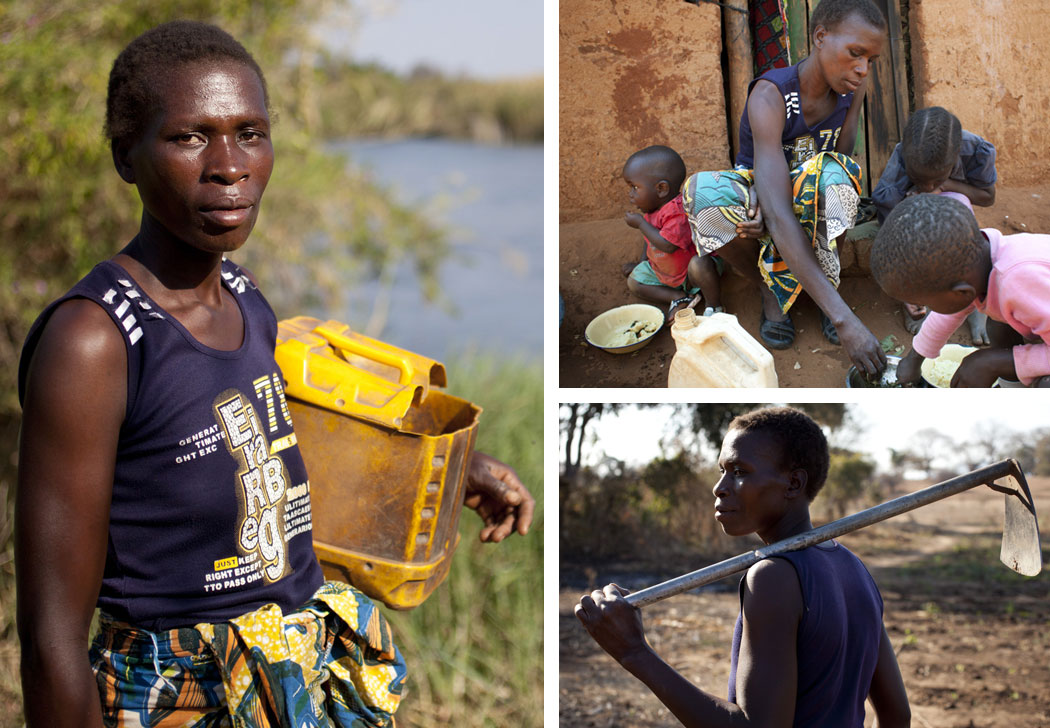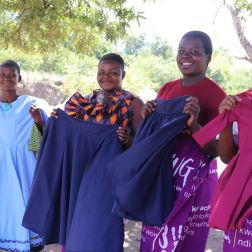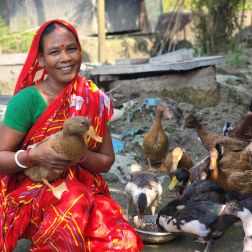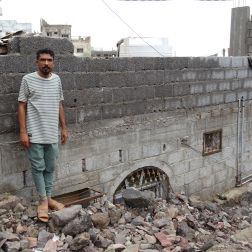- 9 mins read time
- Published: 13th February 2017
Our taxes are not meeting our basic needs and rights
Wanjiru Kanyiha is a Kenyan tax activist from Oxfam partner Inuka [Rise Up] Kenya Ni Sisi. Wanjiru is visiting Ireland to share her first-hand experience of how rising inequality and tax avoidance is harming communities in Africa.
As Wanjiru says: "It is perverse to witness high-rise apartments and superhighways… while people in many parts of the country live without the dignity of a proper toilet.”
Come and meet Wanjiru at our free public events later this month in Belfast and Dublin.

Photo: Wanjiru Kanyiha is in Ireland to raise awareness about the impact of inequality on people like Barbara from Zambia, pictured above. Each day, Barbara faces a stark choice – going hungry or facing crocodiles. Photo: Abbie Trayler-Smith/OxfamI live in Nairobi, Kenya.
The story from Kenya
I live in Nairobi, Kenya. A beautiful city. A city of many contradictions. A city of the haves and have nots. A drive around Nairobi demonstrates just that – from the leafy and upscale neighbourhoods of Karen, Lavington, Muthaiga and Gigiri, which houses the UN headquarters, to the sprawling slums of Kibera, Mukuru, Mathare, Kawangware and Kangemi, just to mention a few, where the majority of the Nairobians live.
Nairobi can be deceptive – so much inequality can lie in such a small area. For example, take Kawangware, a slum which sits juxtaposed in sharp contrast to the paved and well-lit streets of her neighbour Lavington, a suburb located towards the North West part of Nairobi’s Central Business District.
In Lavington, water is scarce and sanitation extremely poor. It is densely populated and the residents have little or no access to essential public services such as hospitals and schools.
Then there’s Kibera – the largest slum in Africa. A badge Nairobi has to wear alongside that of being East Africa’s fastest growing economy. Contradictions.
Inequality is stark in Kenya. According to UN statistics, 46% of Kenya’s population lives below the poverty line. The number of people living in poverty is increasing as the cost of living rises. Children, youth and women have it particularly hard. The Kenya Youth Survey Report indicates that 80% of the Kenya population are young people. The median age is estimated at 19 years old, and about 80 percent of Kenya’s population is below the age of 35.
The survey revealed that unemployment among young people aged between 18 and 20 was a staggering 80%. With little work to go around, both in the formal and informal labour markets, young people today in Kenya find it hard to feed themselves and access basic services. This will continue the cycle of poverty and inequality if we don’t do something about it.
Rise up and mobilise
I work with Inuka Kenya Ni Sisi! Limited, one of Oxfam’s partners in Kenya. Inuka means ‘Rise Up’ in Kiswahili. Our job is to mobilise Kenyans, particularly young people, and get them active about tax and other social issues that affect them. It doesn’t sound like the most exciting topic but when you start thinking about it, having a fair tax system is crucial to fighting inequality.
We engage on the ground, within communities and via online social media platforms. We form and host both online and offline conversations [#MaskaniConversations] that raise awareness on social and tax justice issues and get the communities to mobilise amongst themselves and seek solutions to the various problems that face them.
On a fundamental level, the average Kenyan pays numerous taxes. There is income tax, VAT, excise duty, among other taxes. But after all these taxes, are we getting access to quality, basic essential services? The answers is no – and for as long as I can remember this has been the case for many ordinary citizens in Kenya.
For example, Kenyan doctors have been on strike for two months over pay, benefits, working conditions and other terms for almost two months. Kenyatta National Hospital, Kenya’s largest public referral hospital, and many other county government hospitals have been paralysed by the strike. They have had to turn away patients as there are no doctors to offer services. The stalemate between the doctors and government continues and the Kenyan people are left to their own devices.
This is just one way in which we can see that our taxes are not meeting our basic needs and rights. They aren’t going to the services that will help close the gap between the rich and the rest. The Kenyan government needs to demonstrate that it cares about the doctors because this shows that they care about the citizens, through investing our taxes in our public services, equipping public hospitals and providing better terms for doctors and staff that work in these hospitals.
Our project with Oxfam in Kenya not only focuses on raising awareness among Kenyans of their duty to pay tax, but also their rights to demand that these taxes go into financing essential services that benefit them, that help them lead a better and more dignified life.
The middle class in Kenya ends up paying for the services that the government isn’t delivering. Kenya’s middle income earners have to plunge deeper into their pockets for private healthcare, education, security, water and almost every other social amenity one can think of. They are lucky because they have the means to find private solutions for public problems. But they are effectively paying twice. They pay their taxes and then have to pay for private services that the government fails to deliver.
However, the crucial question is what about those at the bottom who can’t afford to pay for these private services? They are the ones who suffer the most. They are paying taxes but they don’t get the services they need and they are pushed further into poverty.
Meanwhile, the rich corporations and individuals are not paying enough in taxes. This deprives the governments of tax revenues which could be pumped into our national budget. But the big multinational corporations are given incentives and tax breaks and other incentives while the local entrepreneur doesn’t get those incentives.
According to a report by Tax Justice Africa, tax incentives to big corporations cost the Kenyan coffers 100 billion Kenyan shillings a year. That could cover the 2016 budget for primary and secondary education in Kenya twice over. That’s not fair. What’s worse is that those who don’t pay enough are often protected by those in government who make the decisions.
Dignity before development
At Inuka, our mantra is dignity before development. It is perverse to witness high-rise apartments, superhighways and multi-billion infrastructural developments going on, while people in many parts of the country live without the dignity of a proper toilet. This isn’t only about tax justice and inequality; it’s about our lives – the lives and dignity of the Kenyan people. It’s about holding our duty bearers to account to uphold the rights that are in our constitution.
By highlighting some of these issues through our social media platforms, we are able to paint the real picture of what it means for the ordinary citizen not to have access to these services, while at the same time lobbying to the relevant stakeholders to do something about it.
It is this that makes me do what I do and dedicate my time to this cause. It is saddening that Kenya has been independent for over fifty years but we are far from liberating ourselves. We aren’t able to speak up and speak out when we see injustices. Some places, like Turkana in the northern part of Kenya and one of the counties where we are implementing the tax justice programme, still don’t have access to water after more than half a century of independence.
We need to rise up as one people and one voice but this is hard when there are so many inequalities and divisions. We need to make sure our leaders do right by us, to make sure these taxes are paid and pumped into the services Kenyans so badly need.
I am always trying to mobilise my friends. To do this I try and break it down – what does this mean for you? Just because you have food in your belly, it doesn’t mean that your neighbour does, it doesn’t mean that they have access to the services that you are able to enjoy. It’s my job as a campaigner and as a citizen to offer solutions to those problems – or at the very least direct them to a space where the people can seek adequate resolution. The tax justice programme does just that. Fixing the skewed tax system is a concrete way we help to solve economic inequality.
If our freedom fighters or Wangari Maathai, a famous Kenyan environmentalist, gave up or declared the fight hopeless, Kenya wouldn’t be where it is today. Wangari was often beaten and brutalised by the government but she never stopped fighting. We might not win this war today but that does not mean we stop fighting. My little contribution is talking about these issues. Whether the government of the day listens or not, the important thing is not to be silenced. Keep talking, doing, mobilising, pushing.
Then we will know we are on the right side of history.
Wanjiru Kanyiha
Wanjiru will be speaking at our free public events in the MAC in Belfast on 27th February and in the Royal Irish Academy (RIA) in Dublin on 28th February. Find out more and come and hear her in person..
This webpage has been produced with the financial assistance of the European Union. The contents of this webpage are the sole responsibility of Oxfam and can under no circumstances be regarded as reflecting the position of the European Union.
Find out more and take our tax action: https://www.oxfamireland.org/tax




